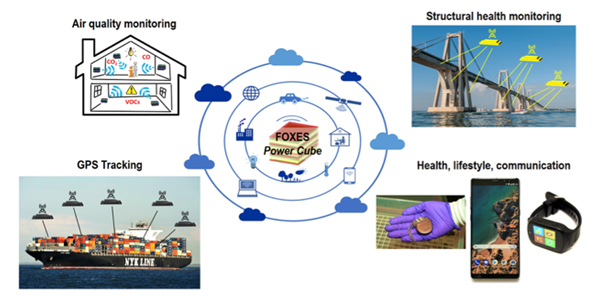FOXES: Development of an emission-free, portable energy supply for autonomous devices
FOXES, a FET-Proactive project was recently approved by the European Commission. FOXES is an acronym for “FullyOxide-based Zero-Emission and Portable Energy Supply”. The aim of the project is the implementation of an emission-free energy supply system for the power supply of wireless devices for the Internet of Things. The AMO GmbH is a partner of FOXES.
The Internet of Things (IoT) is a network of communicating electronic devices. It is the core technology of future-oriented concepts such as autonomous driving and Industry 4.0. IoT devices often have to be used remotely without a network connection. The current solution is to rely on batteries, with or without sources of energy (i.e. a photovoltaic cell). However, batteries have a limited lifespan, often shorter than that of the device itself, and a significant environmental footprint.

“With FOXES, we will take a fully integrated and environmentally friendly approach to this problem,” said Marco Deluca, key scientist at the Materials Center Leoben Research GmbH and project coordinator at FOXES. “Our goal is to implement a so-called Power Cube – an integrated 2 x 2 cm² system that combines a highly efficient solar cell with a multilayer capacitor and an energy management circuit. And we only want to achieve this with cost-effective and environmentally friendly processes and materials, so that the Power Cube has no negative effects on the environment at the end of its service life.”
At the end of the project, the Power Cube will be used to power a network of wireless air quality sensors in the urban area of Barcelona. “We chose Barcelona because it is one of the cities in Europe that is most affected by NO2 and O3 pollution,” said J. Daniel Prades of the Universitat de Barcelona. “FOXES demonstrators will enable unprecedented spatial resolution in emissions monitoring, making it easier to identify problematic areas and implement effective countermeasures. We will demonstrate the potential of FOXES technology to improve the wellbeing of citizens in urban communities.”
If the FOXES testbed is a system for monitoring air quality, the technology generally targets all mobile platforms that need an interface for electronics and sensors – in the transport sector, in industry and in emergency situations.
FOXES is a project of the Materials Center Leoben Forschung GmbH (AT), the Bergische Universität Wuppertal (DE), the AMO GmbH (DE), the UNINOVA – Instituto de Desenvolvimento de Novas Tecnologias (PT), and the Universitat de Barcelona (ES). Funded by the “Horizon 2020 – FET Proactive Programme”. The project builds on groundbreaking preliminary results of the project partners in various areas of materials science, chemistry, technological processes and electronics and aims to establish a new technological paradigm from. “It is in the spirit of the FET Proactive Programs to combine top results from different research branches in order to establish a new technological paradigm with high potential for Europe’s economy and society”, says Max Lemme from AMO GmbH.
The official launch of the project had to be postponed to October 2020 due to the COVID-19 pandemic. “We will use this time to ensure a quick start in October and the ability to respond quickly and flexibly to a possible second wave,” said Deluca. “We believe that international cooperation, as promoted by the Horizon 2020 program, is vital to look beyond these troubled times and support Europe’s recovery.”
FOXES is funded by the European Union’s Horizon 2020 research and innovation program under grant agreement No 951774.
Article provided by Federica Haupt (AMO), translated by Mike Schwarz (Robert Bosch)
